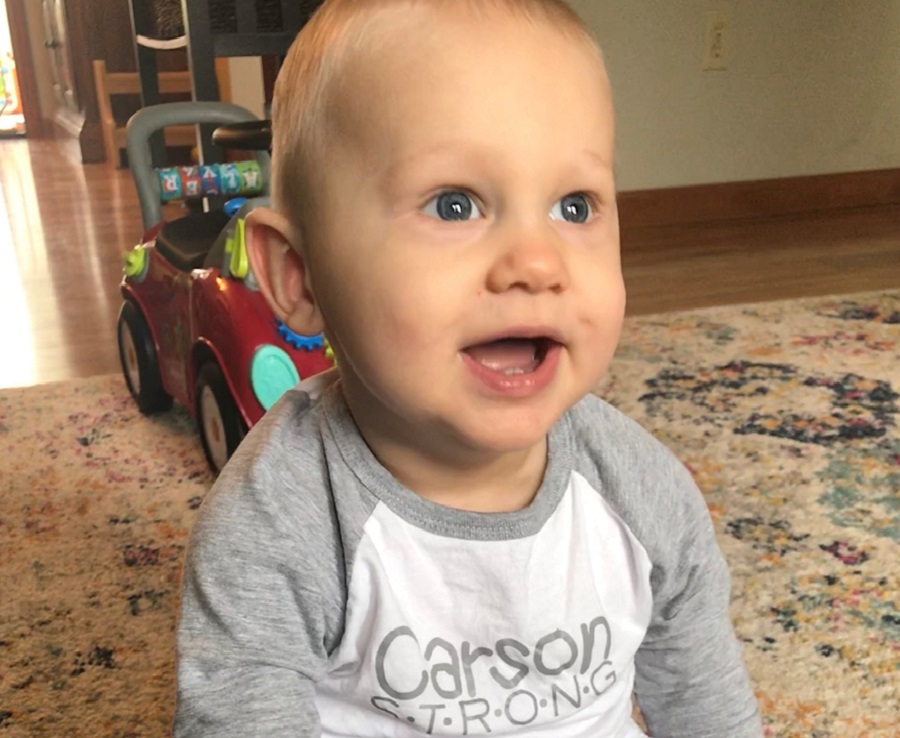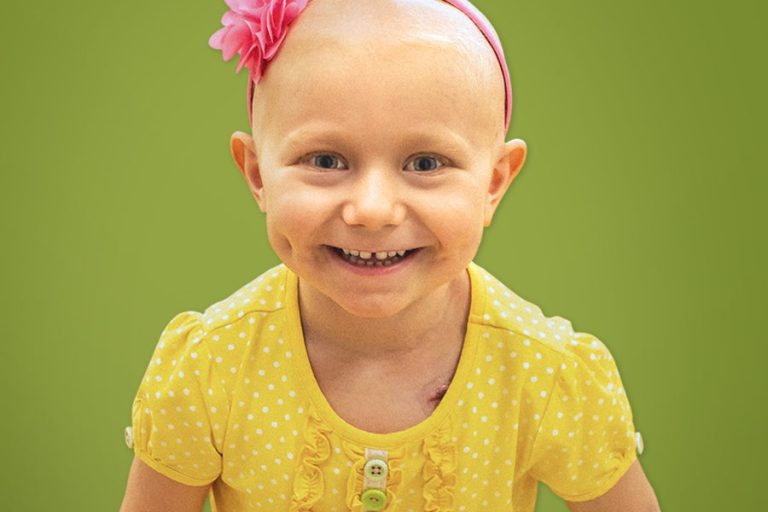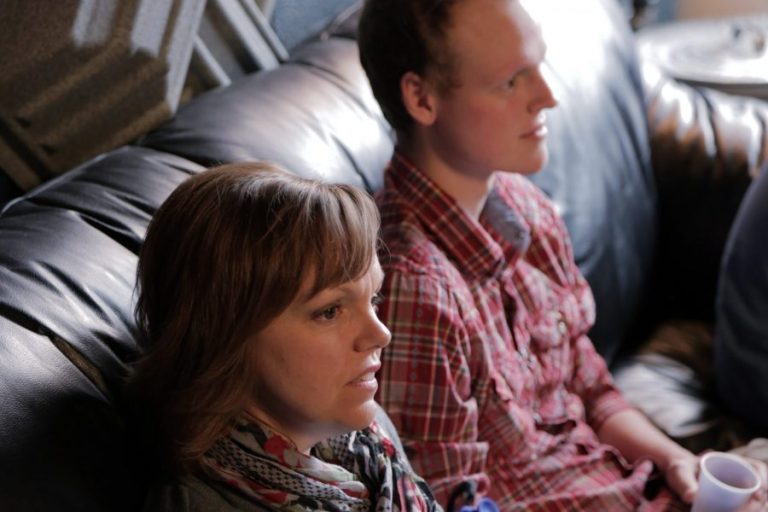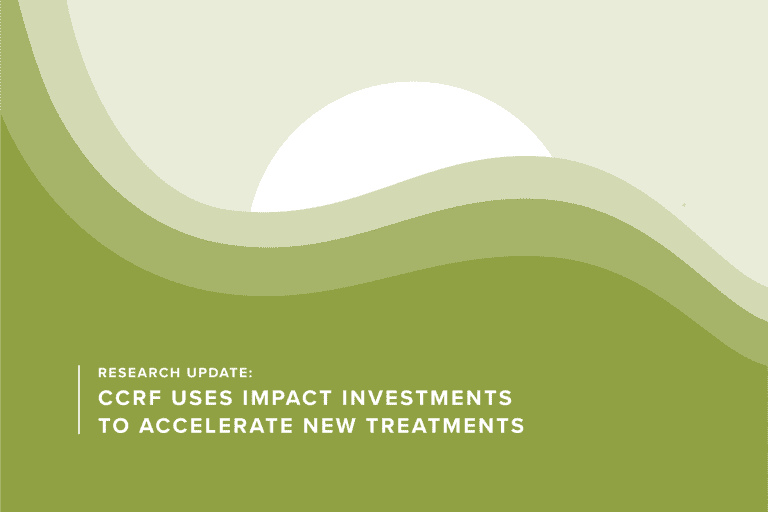On an otherwise normal morning in July, 5-month-old Carson woke up crying – hard. Kelly, Carson’s mom, did everything she could to comfort him, but Carson was inconsolable and soon started vomiting. Kelly took him to pediatric urgent care, where doctors did an x-ray and then sent Carson and Kelly to the emergency room. Carson was admitted that night, since it still wasn’t clear what was causing him that much pain.
As he lay in the hospital crib, Kelly noticed something unusual. He was kicking with his right leg, but not his left. With this new symptom, Carson’s doctors ordered an x-ray and ultrasound of his leg to rule out infection or injury. When both of those tests came back normal, Carson’s doctors started to think what was going on could be neurological, so they ordered an MRI for the next day.
“The MRI found a mass in his brain the next day,” Kelly said. “That was the hardest moment. When he was officially diagnosed was hard too, but when they found the tumor, it just hit me so hard. I just wanted it out.”
Carson’s official diagnosis came shortly after – congenital glioblastoma, an aggressive and rare brain cancer. From that moment on, Kelly leaned on her support system. Her sister, a pediatrician, also happened to be an attending physician at the same hospital where Carson received treatment. She went with Kelly to appointments to take notes and ask questions. People who cared about Carson and his family came out of the woodwork, creating meal trains, donating gift cards and bringing coffee to the tired parents during long hospital stays.
“The most comforting thing people did was just show up for our family,” Kelly said. “The friends who really make a difference are the ones who know they can’t say ‘it’s going to be ok,’ but they’re willing to give me a hug and listen to me when I need them.”
Since Carson’s diagnosis, everything changed for him and his family. He’s undergone brain surgery, 5 months of inpatient chemotherapy, 4 months of outpatient chemotherapy, fought off two blood infections and is now working hard in physical and occupational therapy to develop his mobility. Kelly is thankful that 14-month-old Carson is young enough not to know when he’s missing out – cancer treatment is his version of normal. But Kelly remembers a time before cancer was part of her life, and realizes how much it has changed her. She used to have a fairly relaxed parenting style, but Carson’s hands-on treatment protocol has changed that. Today, naps and bedtime are the hardest.
“A nap was when this all started. He woke up from that nap crying and vomiting, and that’s when our lives changed,” Kelly said. “Because of this, letting him cry at nighttime has been very difficult because I don’t know what might be going on. Is he just being a baby or is he in pain?”
Looking for Hope
Carson’s type of brain tumor is extremely rare, and statistics for childhood brain tumors are often grim. So when he was first diagnosed, Kelly decided she was only going to look for stories of hope. What she found comforted her – there are survivors out there that have given Kelly hope, but because this cancer is so rare, it is difficult for researchers to find enough participants for studies. Even through there is hope, the diagnosis is still an aggressive form of cancer and there are still a lot of unknown about treatment and outcomes.
“When you get Carson’s tumor as an infant, the prognosis is more hopeful than the same tumor in an adult. In my mind, I would hope that the hopefulness of this diagnosis as an infant would drive research to set a standard protocol of treatment, but because his diagnosis is so rare and the funding isn’t there, that’s not the case,” Kelly said. “Rare has a different meaning to me now. When it’s your son, ‘rare’ just doesn’t matter anymore. That’s why I’m sharing his story.”
A Future for Carson
It’s hard for Kelly to look too far into the future, so right now, she’s just looking forward to the end of Carson’s treatment. She’s been thinking about throwing an “end-of-chemo” party to celebrate all that Carson has been through. However, she understands that finishing treatment doesn’t mean Carson’s cancer experience is over.
“If we do an end-of-chemo party I feel like people will think it’s over, and it’s not,” Kelly said. “It’s not like I’m done being a cancer mom, I can’t stop worrying. He’s not cured. We’ll always have to live with the possibility of a scan not being normal. He deserves to be celebrated after going through all he’s been through, but it will never be done.”
When Kelly allows herself to think further than the next few months, she imagines Carson on his first day of Kindergarten. She imagines him running around outside with his older siblings and celebrating birthdays far into the future. But for now, she’s making a point to be grateful for the little victories, like the pride she sees on Carson’s face when he conquers a tough task in therapy.
“We’ve spent a lot of time, just the two of us, through all this,” Kelly said. “He’s my sidekick every day and it’s awesome. I want to see him keep persevering through everything.”
Support Better Treatments for Kids Like Carson
A world without childhood cancer is possible - but not without your help. Be part of the search for better treatments and cures for kids like Carson.




